Top Marketing Attribution Tools for UK Businesses 2025

Understanding which marketing channels truly drive conversions is no longer a guessing game. It’s a critical business intelligence function that separates high-growth businesses from those leaving money on the table. If you’ve ever asked, “Which advert, social post, or email actually led to that last sale?”, you’re asking an attribution question. The answer lies in using the right marketing attribution tools to connect the dots between every customer touchpoint and your revenue.
This guide is designed to cut through the complexity and help you find the platform that fits your specific needs. We’ve moved beyond generic marketing copy to provide an in-depth, practical analysis of the leading solutions available to UK businesses. Whether you’re an ecommerce retailer optimising your ad spend, a B2B marketing manager tracking complex sales cycles, or a startup needing to prove ROI, this resource is your starting point.
Here, you will find a comprehensive breakdown of 12 top-tier platforms. Each review details:
- Key Features: What makes the tool stand out?
- Ideal Use Case: Who is this platform built for?
- Pricing Insights: What level of investment is required?
- Pros & Cons: An honest assessment of strengths and limitations.
We’ve organised everything for clarity, including direct links and screenshots for each tool, helping you make a more informed and strategic decision. This isn’t just a list; it’s a detailed guide to choosing the marketing attribution software that will give you a clear, data-backed view of your entire customer journey and help you invest your budget with confidence. Let’s find the right tool for you.
1. Google Analytics 4 (GA4)
For many UK-based SMEs and startups, Google Analytics 4 (GA4) is the logical first step into the world of marketing attribution tools. Its primary advantage is its accessibility; it’s completely free and already integrated into the digital ecosystem of most businesses. GA4 moves beyond the last-click model of its predecessor, offering a more nuanced view of the customer journey.
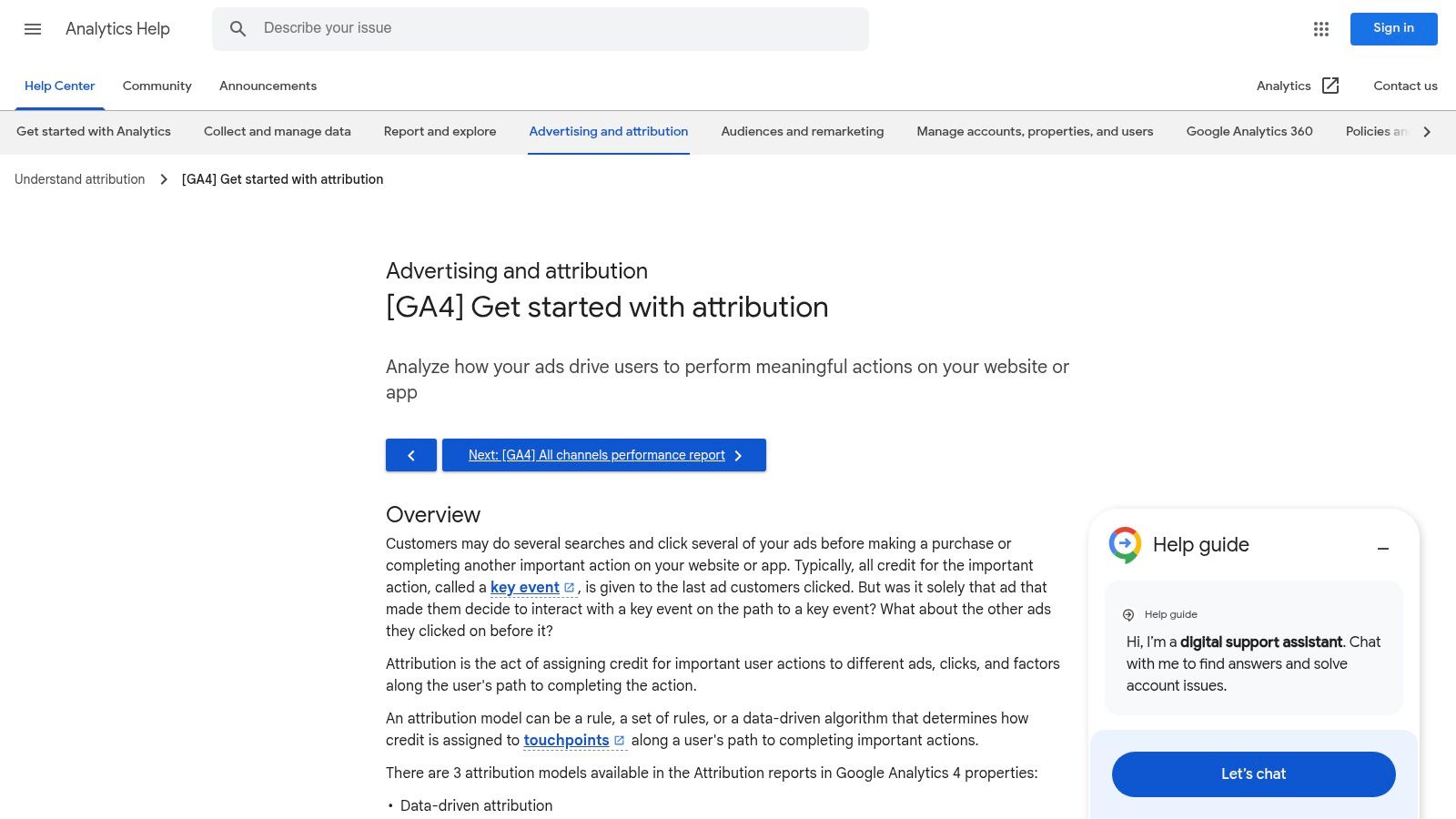
The platform’s standout feature is its native data-driven attribution (DDA) model, which uses machine learning to assign credit to various touchpoints. This is particularly powerful for businesses running campaigns across multiple Google channels, as it provides a holistic view without extra cost. To fully understand the concepts behind this, you can explore more about what marketing attribution is and how it works. The ‘Advertising’ workspace in GA4 is where you’ll find essential reports like the ‘Model Comparison’ and ‘Conversion Paths’ tools, allowing you to visualise how different models impact channel valuation.
Core Features & Limitations
While GA4 provides a robust entry point, it’s not without its limitations. The transition from Universal Analytics saw a reduction in the number of standard, rules-based models available, pushing users towards the DDA model. For the DDA model to be effective, it requires a significant volume of conversion data, which can be a hurdle for smaller businesses or those with long sales cycles.
| Aspect | Details |
|---|---|
| Best For | SMEs, startups, and marketing managers wanting foundational, cross-channel insights without additional investment. |
| Pricing | Free. A paid version, Analytics 360, exists for large enterprises with much higher data and feature requirements. |
| Key Advantage | Seamless, native integration with the Google Ads and Google Marketing Platform ecosystem. |
| Limitation | The data-driven model requires substantial conversion data to function accurately, potentially limiting its utility. |
2. Adobe Marketo Measure (formerly Bizible)
For B2B organisations with long, complex sales cycles, Adobe Marketo Measure (formerly Bizible) is an enterprise-grade solution that connects marketing efforts directly to revenue. It moves far beyond standard web analytics by integrating deeply with CRM platforms like Salesforce, tracking every marketing and sales touchpoint from the first ad click to the final closed deal. This provides a granular, revenue-centric view of marketing performance.
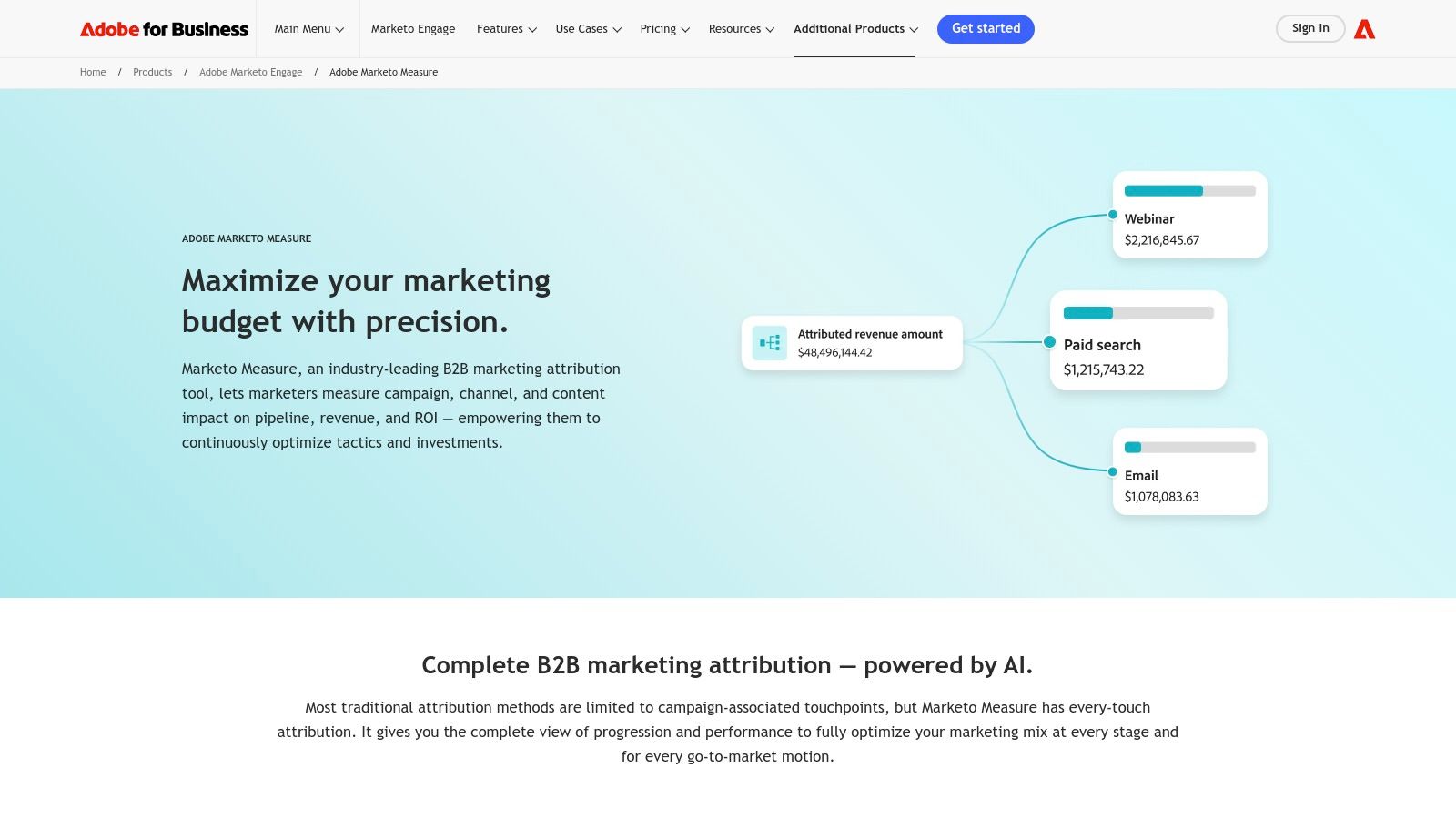
The platform’s strength lies in its sophisticated, pre-built B2B attribution models, including U-shaped, W-shaped, and a full-path model that accounts for every interaction. This allows marketing teams to understand which channels are driving key pipeline stages, not just initial leads. For UK businesses aiming to prove marketing ROI to the board, Marketo Measure offers one of the most robust marketing attribution tools available, tying campaign spend directly to revenue outcomes and customer lifetime value.
Core Features & Limitations
Marketo Measure is a powerful, but complex, tool that requires significant investment in both cost and expertise for setup and management. Its true value is unlocked when used within the broader Adobe or Marketo ecosystem, providing unparalleled insight into account-based marketing (ABM) strategies and long sales journeys. However, its enterprise focus and pricing model make it less accessible for many SMEs.
| Aspect | Details |
|---|---|
| Best For | Enterprise-level B2B marketing teams with complex, multi-stage sales cycles and a need to prove direct revenue impact from their campaigns. |
| Pricing | By request. Typically sold as part of a larger Adobe Experience Cloud or Marketo Engage package, reflecting its enterprise positioning. |
| Key Advantage | Deep CRM integration that provides true multi-touch revenue attribution, connecting marketing activity directly to sales pipeline and deals. |
| Limitation | High complexity and cost, requiring specialised expertise for implementation and ongoing management, making it unsuitable for smaller businesses. |
3. Adobe Analytics – Attribution in Analysis Workspace
For enterprise-level organisations, Adobe Analytics offers one of the most powerful and flexible marketing attribution tools available. Integrated directly within its Analysis Workspace, the platform moves far beyond standard models by incorporating advanced algorithmic attribution, including sophisticated methods like the Shapley value. This allows analysts to quantify the marginal contribution of each marketing touchpoint with a high degree of mathematical rigour, providing a far more nuanced understanding of channel performance.
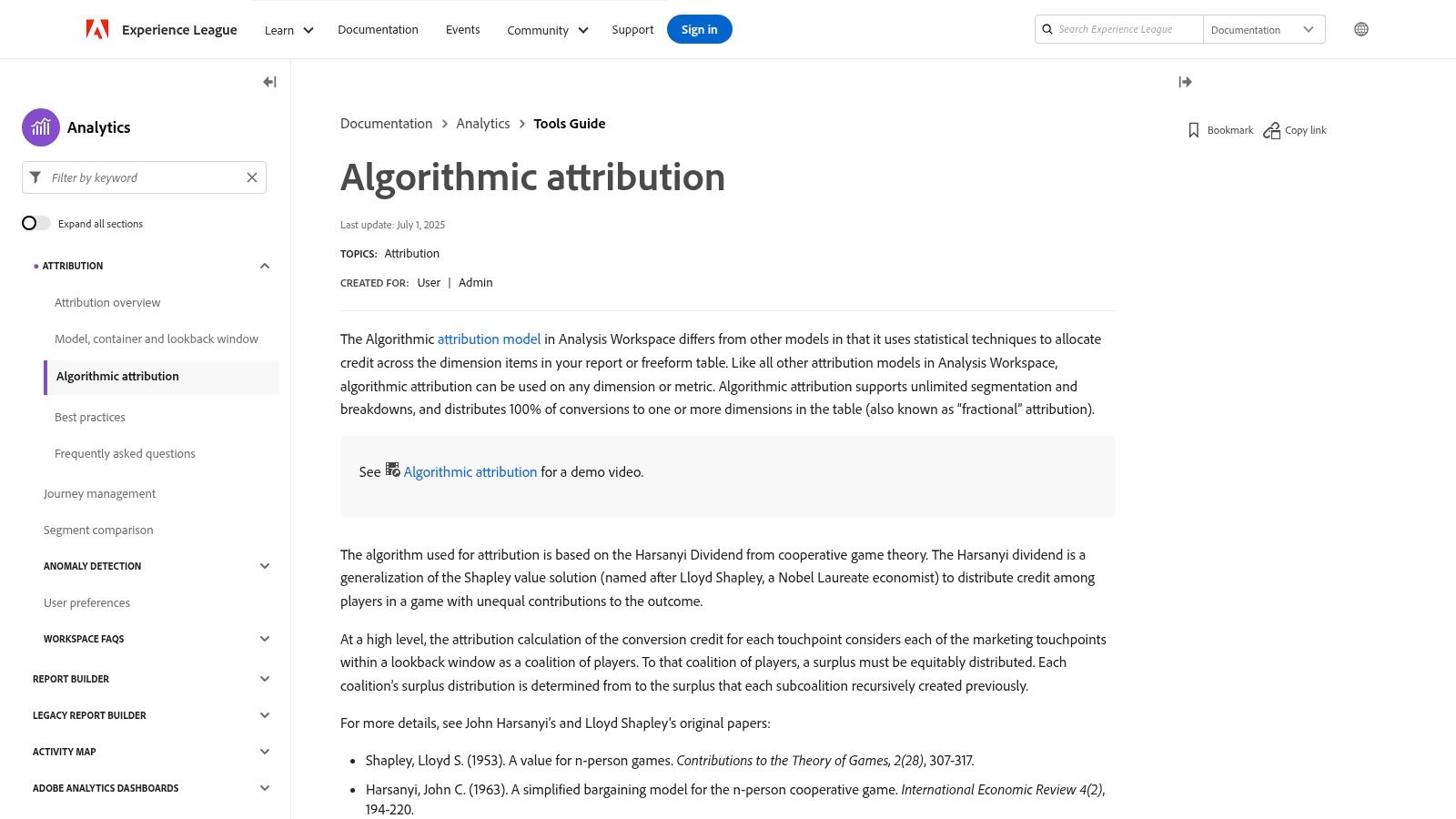
A key differentiator for Adobe Analytics is its limitless and dynamic model comparison capability. Users can apply attribution models to any dimension or metric on the fly, not just paid media channels, offering a holistic view of the entire customer journey. This includes comparing models with configurable lookback windows and seeing the results processed instantly. For those looking to deepen their foundational knowledge, it’s helpful to understand the core principles behind what attribution modelling is. The flexibility to apply these complex models to owned and earned channels provides insights that many other platforms cannot match.
Core Features & Limitations
While incredibly powerful, Adobe Analytics is designed for seasoned analysts and data scientists. Its interface and capabilities present a steep learning curve for those unfamiliar with advanced analytics concepts. The platform’s strength lies in its transparency and depth, but this requires a significant investment in both licensing and skilled personnel to unlock its full potential.
| Aspect | Details |
|---|---|
| Best For | Large enterprises and organisations with dedicated data analyst teams requiring deep, customisable attribution insights. |
| Pricing | Enterprise Licensing. Pricing is bespoke and based on data volume and specific product suites. |
| Key Advantage | Unmatched flexibility with algorithmic models and the ability to apply attribution to any metric or dimension. |
| Limitation | The high cost and steep learning curve make it inaccessible for most SMEs and teams without specialised analysts. |
4. Ruler Analytics (UK)
For UK businesses heavily reliant on lead generation and offline conversions like phone calls, Ruler Analytics offers a specialised solution. This UK-based platform excels at closing the loop between marketing activities and actual sales revenue, particularly for companies with longer sales cycles. It bridges the gap that often exists when a lead moves from an online form or call into a CRM system, ensuring the original marketing source gets the credit it deserves.
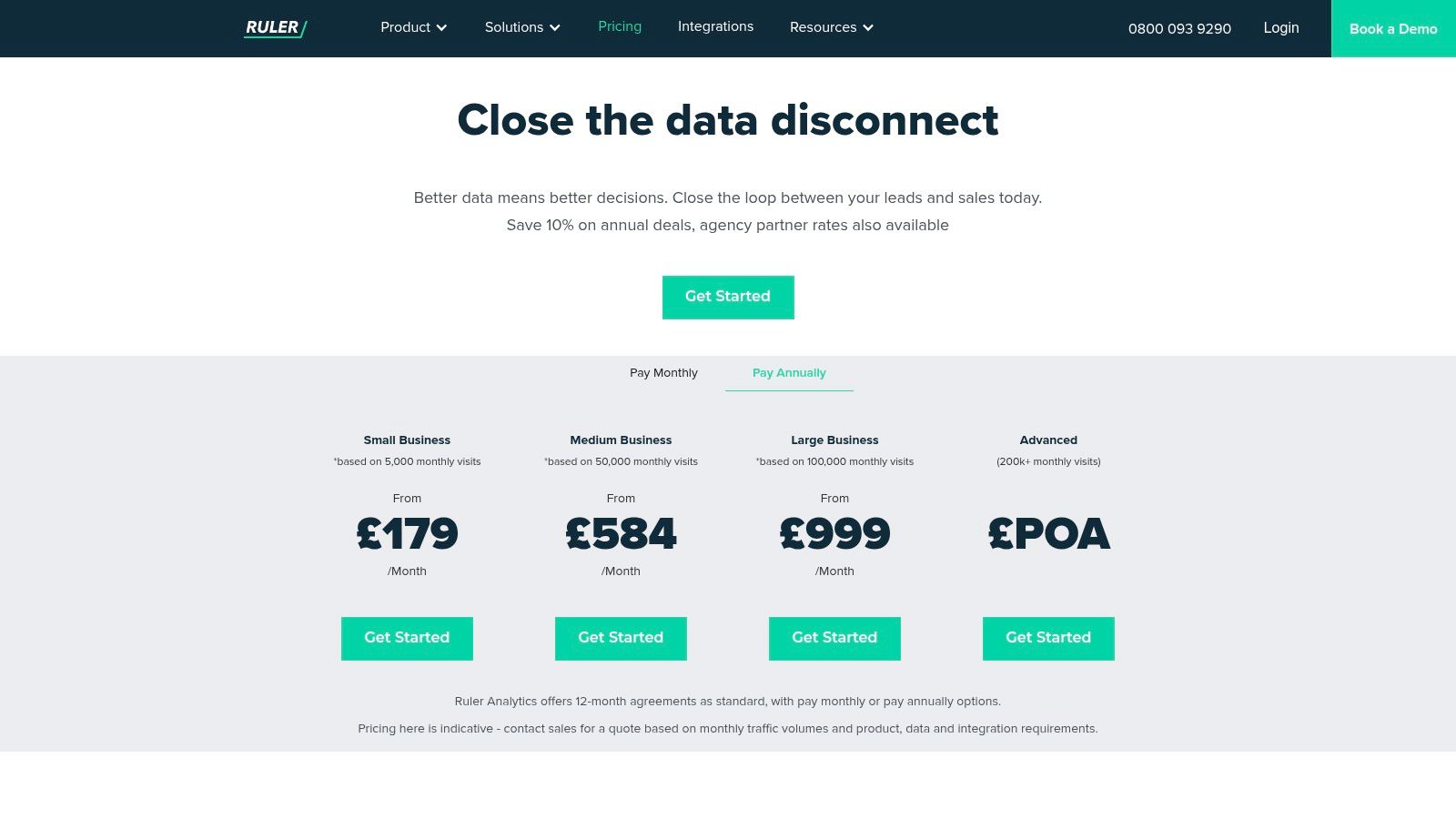
Ruler’s core strength is its ability to track the entire customer journey, from the first anonymous website visit to the final sale value within your CRM. By integrating with platforms like Salesforce and HubSpot, it sends marketing source data for every lead, including calls, live chats, and form submissions. When a sale is made, it pulls the revenue data back, attributing it to the specific campaigns that influenced the customer. This makes it one of the most effective marketing attribution tools for demonstrating marketing’s direct impact on the bottom line.
Core Features & Limitations
The platform’s dynamic number insertion for call tracking is a key feature, automatically showing a unique phone number to visitors from different channels. This allows for precise attribution of inbound calls. However, businesses should be aware that the pricing model scales with website traffic, and call tracking incurs additional costs for phone numbers and minutes used. The standard 12-month contract may also be a consideration for smaller businesses seeking more flexibility.
| Aspect | Details |
|---|---|
| Best For | UK-based, B2B, and high-value B2C companies that rely on phone calls, forms, and CRM-managed sales cycles. |
| Pricing | Starts from £199/month, scaling with website traffic. Call tracking minutes and numbers are an additional cost. Standard 12-month agreements. |
| Key Advantage | Excellent at connecting anonymous website visits and offline conversions (like calls) to closed revenue in a CRM. |
| Limitation | The pricing model and additional costs for call tracking can become a significant investment for businesses with high traffic or call volume. |
5. Dreamdata
For B2B companies navigating long and complex sales cycles, Dreamdata offers a specialised marketing attribution solution designed to connect marketing activities directly to pipeline and revenue. It moves beyond vanity metrics to provide an account-based view, making it an excellent fit for businesses employing Account-Based Marketing (ABM) strategies. The platform excels at stitching together data from ad platforms, your CRM, and analytics to reveal which touchpoints influence deals.
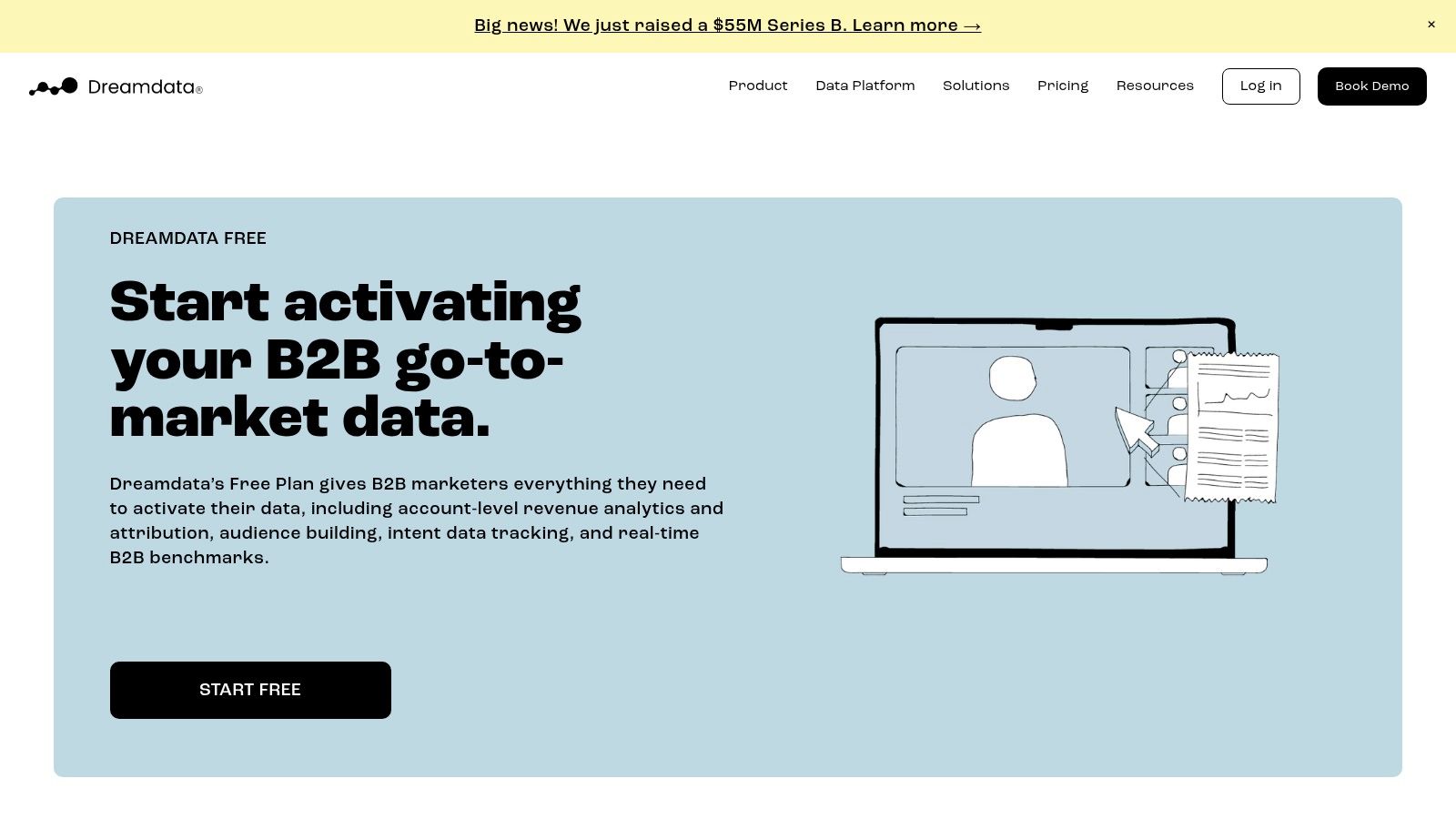
Dreamdata’s standout feature is its ability to map the entire customer journey, from the first anonymous website visit to a closed-won deal in your CRM. This makes it a powerful asset alongside dedicated customer journey mapping tools by providing the hard data to validate your journey maps. Its free plan is a significant draw, offering robust account-level analytics and multi-touch attribution that allows smaller B2B teams to start proving marketing ROI without a hefty initial investment.
Core Features & Limitations
Dreamdata is built on the premise that B2B marketing success is measured in revenue, not just leads. Its platform is organised to reflect this, with features like audience building and intent tracking to help sales and marketing teams align their efforts. However, its strength in the B2B space is also its main limitation; the platform is less suited for high-volume, short-cycle direct-to-consumer (DTC) e-commerce models where the focus is on individual transactions rather than complex account journeys.
| Aspect | Details |
|---|---|
| Best For | B2B marketing teams, especially those with long sales cycles, using ABM strategies and relying heavily on CRM data. |
| Pricing | Offers a Free plan with core attribution features. Paid plans are available with fixed pricing for advanced capabilities. |
| Key Advantage | Deep integration with CRMs (like HubSpot, Salesforce) to tie marketing efforts directly to sales pipeline and revenue. |
| Limitation | Effectiveness is highly dependent on well-maintained and integrated CRM and ad platform data; not ideal for B2C e-commerce. |
6. AppsFlyer
For businesses where mobile apps are the core of their strategy, generalist marketing attribution tools often fall short. AppsFlyer is a market-leading Mobile Measurement Partner (MMP) designed specifically to untangle the complex mobile user acquisition journey. It provides granular, real-time insights into how users discover and interact with an app, tracking everything from ad clicks and impressions to in-app events.
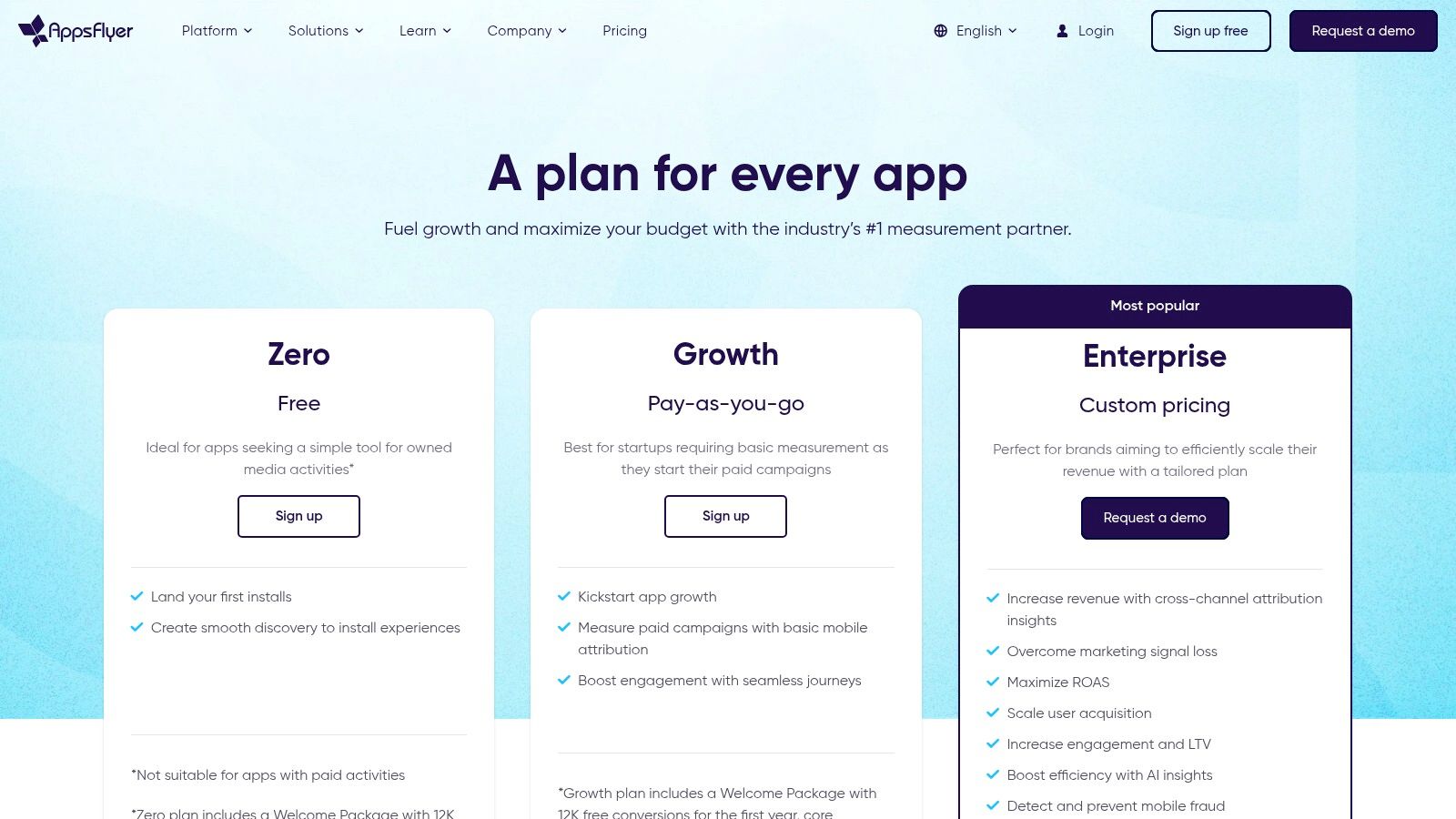
Its strength lies in its vast integration network, connecting with thousands of ad platforms to provide a unified view of performance. Features like deep linking via its OneLink tool are crucial for creating seamless user experiences from ad to app, while its robust support for Apple’s SKAdNetwork and Android’s Privacy Sandbox helps marketers navigate the changing privacy landscape. This specialisation makes it an indispensable tool for app-first UK businesses looking to optimise ad spend and drive growth.
Core Features & Limitations
While AppsFlyer offers an impressive suite of tools for mobile attribution, its focus is firmly on the app ecosystem. Businesses whose customer journeys are primarily web-based may find its capabilities too specialised. The pricing model, while offering a free entry point, scales with conversions, which can become a significant expense for rapidly growing apps. Advanced features like raw data exports and sophisticated fraud protection are often gated behind higher-tier plans or add-ons, increasing the total cost of ownership.
| Aspect | Details |
|---|---|
| Best For | Mobile-first businesses, app marketers, and user acquisition managers needing deep, real-time mobile attribution and analytics. |
| Pricing | Offers a free ‘Zero’ plan for startups. The ‘Growth’ plan is pay-as-you-go, charging per conversion. Enterprise plans available. |
| Key Advantage | Extensive integration with thousands of mobile ad networks and platforms, providing a comprehensive view of app campaigns. |
| Limitation | The pay-per-conversion model can become costly during rapid scaling, and many advanced features require more expensive plans. |
7. Adjust
For businesses heavily invested in mobile applications, Adjust provides a specialised and robust suite of marketing attribution tools. It is engineered from the ground up to address the unique challenges of the mobile ecosystem, from SKAdNetwork (SKAN) measurement on iOS to sophisticated fraud prevention. Adjust offers a clear view of the entire mobile user journey, tracking both paid and organic touchpoints to reveal which campaigns are genuinely driving app installs and in-app events.
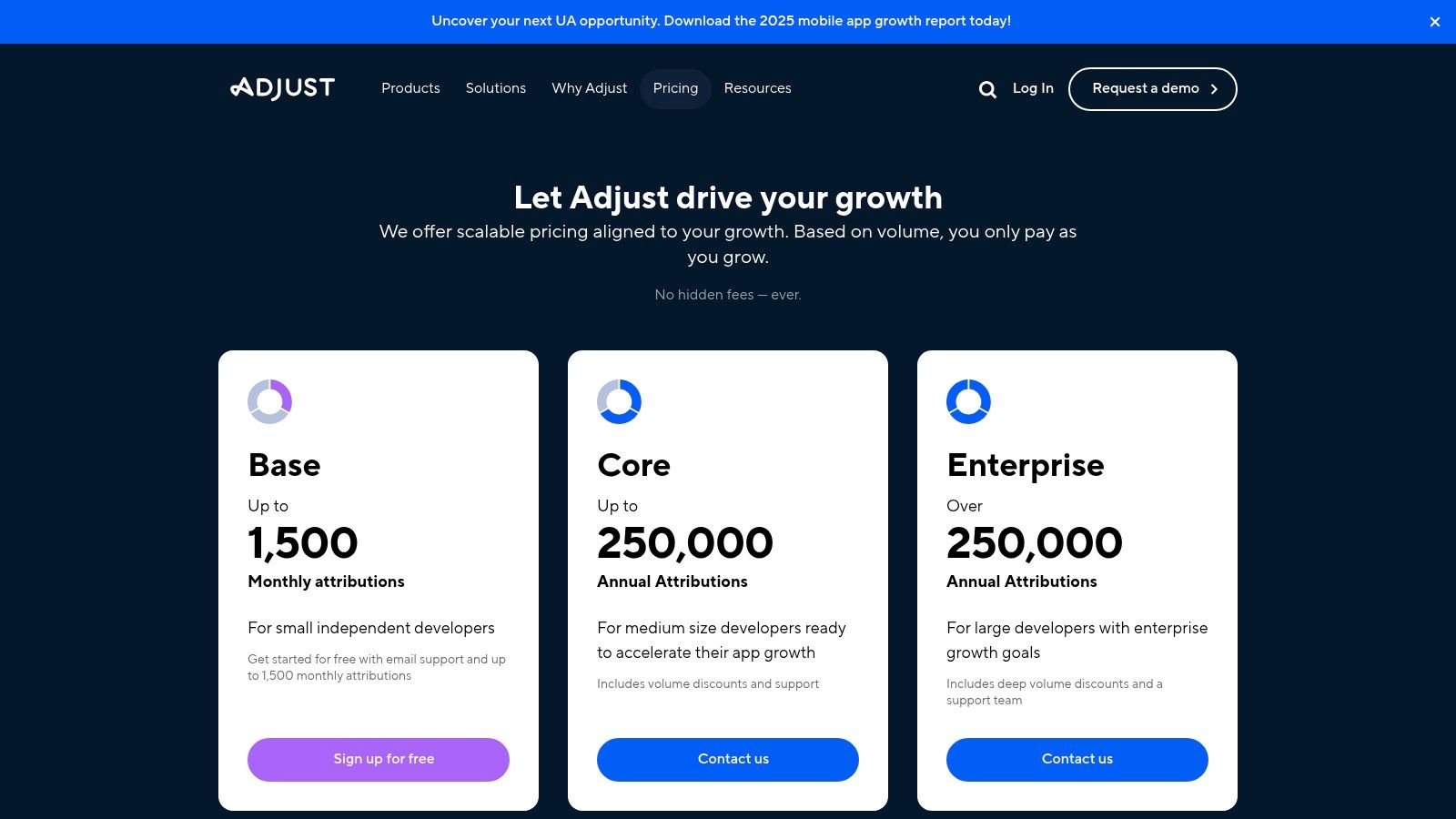
The platform’s strength lies in its granularity and commitment to data privacy. Businesses can customise attribution windows for both clicks and impressions, gaining precise control over how credit is assigned. Furthermore, its GDPR and CCPA compliance, coupled with the option for EU data residency, makes it a secure choice for UK and European companies navigating stringent data protection regulations. The transparent, volume-based pricing model also allows businesses to scale their analytics capabilities as their user base grows.
Core Features & Limitations
Adjust’s app-centric focus is its greatest asset but also its primary constraint. While it excels at mobile, attributing web-based conversions requires additional setup and may not be as seamless as its core mobile functionality. The free ‘Base’ tier is an excellent entry point for startups, but accessing advanced features like raw data exports typically necessitates moving to a higher, paid plan.
| Aspect | Details |
|---|---|
| Best For | Mobile-first businesses, app developers, and marketing teams needing deep insights into mobile user acquisition and engagement. |
| Pricing | Offers a Free ‘Base’ tier. Paid plans (‘Core’, ‘Enterprise’) are priced based on monthly attributed installs and in-app events. |
| Key Advantage | Strong focus on mobile-specific attribution, including SKAN solutions, robust fraud prevention, and excellent data privacy compliance. |
| Limitation | Primarily focused on app attribution; comprehensive web-to-app journey tracking can be more complex to implement. |
8. Branch
For businesses where mobile apps are the centre of the customer experience, Branch provides a specialised set of marketing attribution tools that bridge the gap between web and app journeys. It’s renowned for its powerful deep linking infrastructure, which ensures a seamless user transition from any channel directly to specific in-app content. This capability is fundamental to accurately attributing app installs and subsequent engagement to the correct marketing touchpoints.
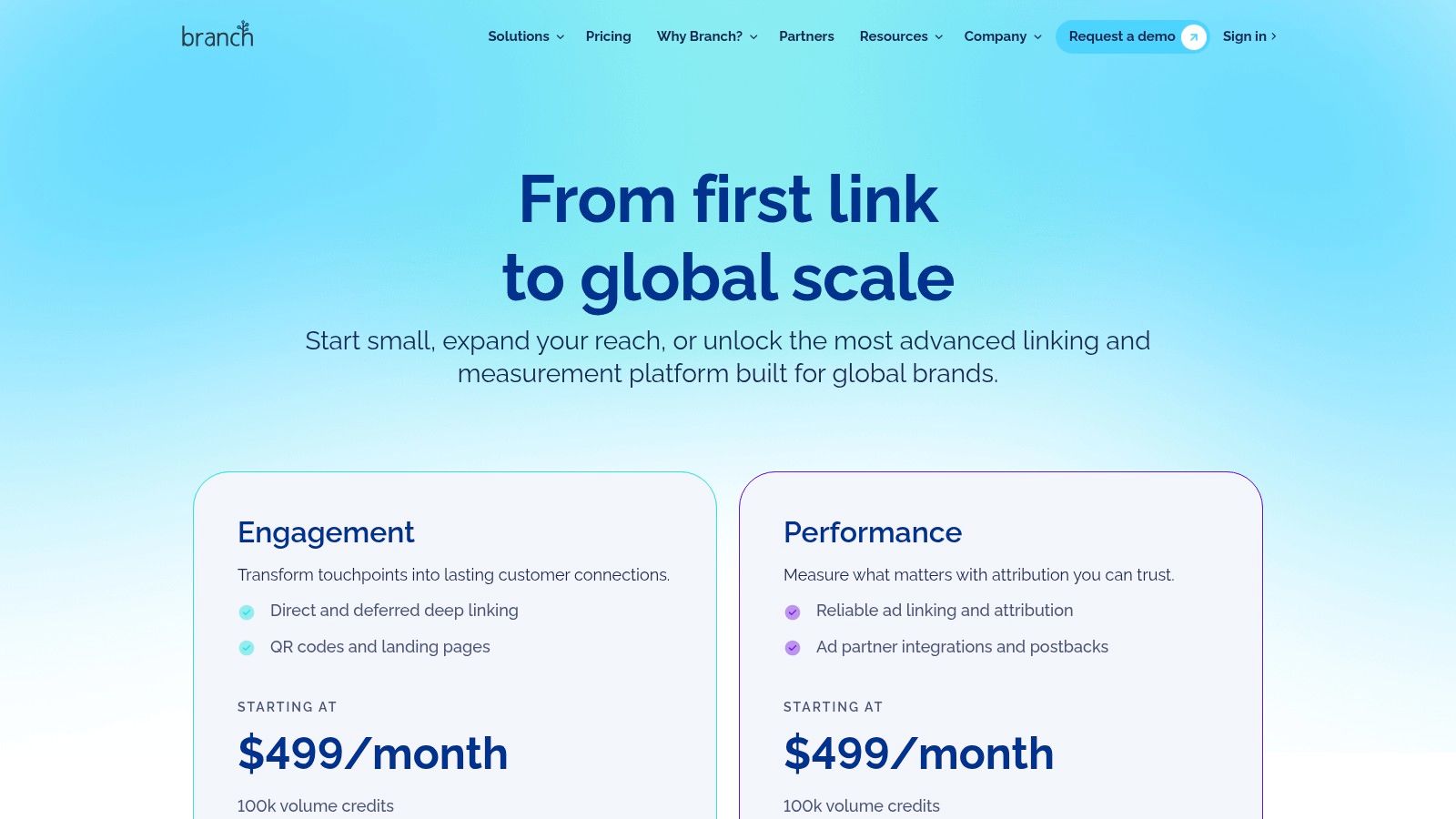
Branch’s platform excels at mobile-first attribution, integrating with a vast ecosystem of ad partners to provide a comprehensive view of campaign performance. It uses deterministic and probabilistic matching to connect users across different platforms, giving marketers clarity on which ads, emails, or social posts are driving valuable in-app actions. This makes it an indispensable tool for app-centric businesses looking to optimise user acquisition and engagement strategies with precision.
Core Features & Limitations
While its linking technology is best-in-class, Branch’s focus is distinctly on the mobile app ecosystem. Businesses that are purely web-based may find its feature set excessive and not aligned with their primary needs. The platform’s strength lies in combining its robust linking capabilities with measurement, offering a unified solution that many competitors handle separately.
| Aspect | Details |
|---|---|
| Best For | Mobile-first businesses, app marketers, and enterprises needing to create seamless web-to-app user journeys. |
| Pricing | Custom pricing. A ‘Launch’ plan exists for startups, with enterprise-level tiers available at branch.io/pricing/. |
| Key Advantage | Unparalleled deep linking technology combined with a comprehensive mobile measurement and partner ecosystem. |
| Limitation | Highly specialised for mobile apps; web-only businesses will not leverage its core strengths and may find it costly. |
9. Kochava
For businesses heavily invested in mobile app marketing, Kochava presents a specialised and powerful solution among marketing attribution tools. It’s designed from the ground up to handle the complexities of mobile, CTV, and cross-device user journeys, offering deep insights into app installs, in-app events, and user LTV. This focus makes it a go-to platform for app-first businesses needing granular control over their mobile marketing ecosystem.
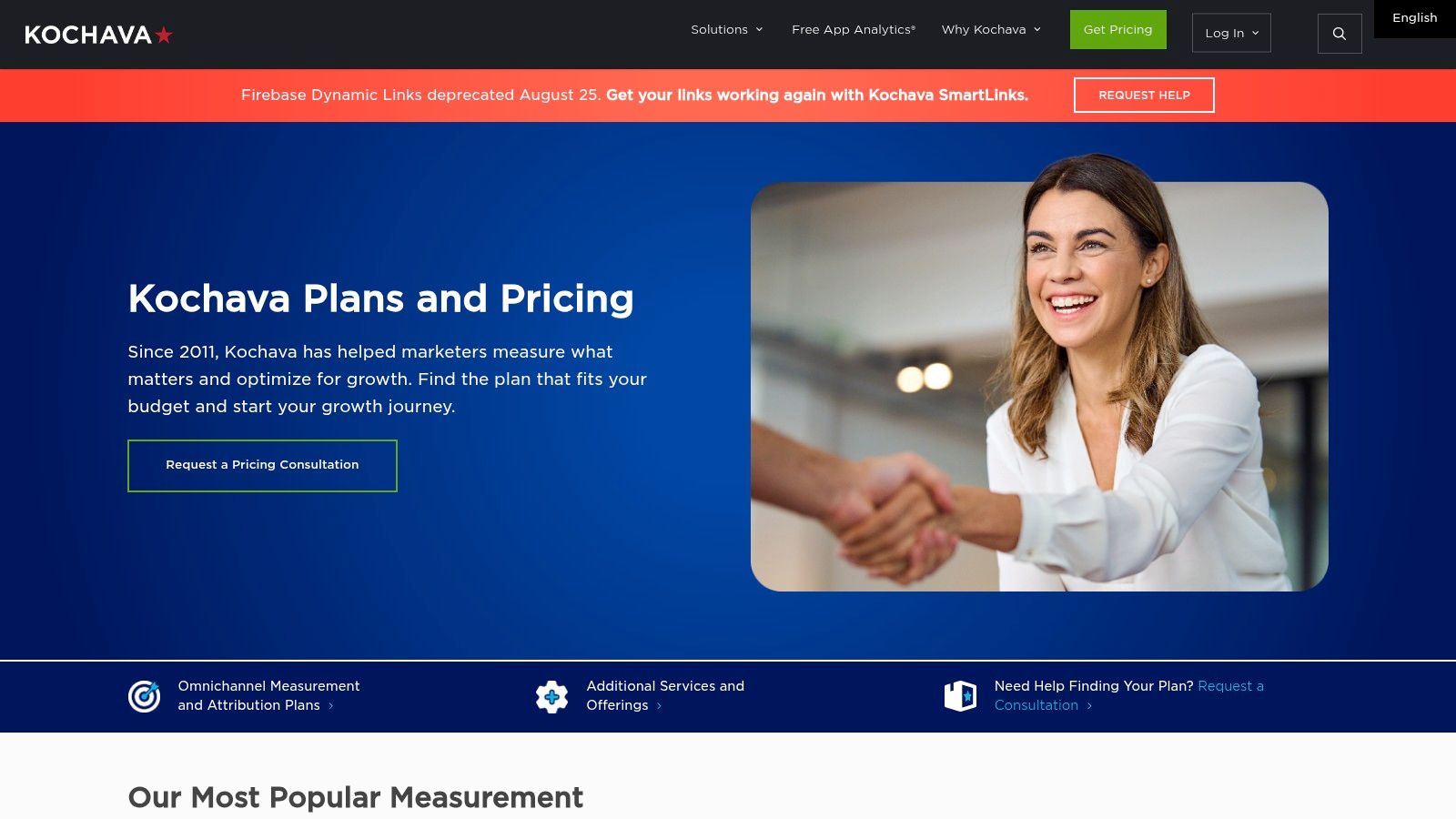
Kochava stands out with its highly configurable attribution rules and robust fraud prevention suite, allowing marketers to trust their data and customise models to fit unique business logic. Features like IdentityLink facilitate advanced identity resolution, helping to stitch together user paths across different devices and platforms. Its deep linking capabilities are also crucial for creating seamless user experiences from ad click to in-app action, a key component for maximising conversion rates in mobile campaigns.
Core Features & Limitations
The platform’s free tier, “Free App Analytics,” is a significant advantage for startups and developers, offering attribution for up to 10,000 monthly conversions without cost. However, to unlock its full potential, including web measurement, cost aggregation, and more advanced features, businesses will need to upgrade to paid plans. While comprehensive, the platform can present a steeper learning curve for teams not already well-versed in mobile measurement partner (MMP) specifics.
| Aspect | Details |
|---|---|
| Best For | Mobile-first businesses, app developers, and performance marketers needing specialised in-app and CTV attribution. |
| Pricing | Offers a Free App Analytics tier. Paid plans like Foundation and Enterprise unlock web and advanced features. |
| Key Advantage | A generous free tier for early-stage apps and powerful, highly configurable rules for mobile-centric attribution. |
| Limitation | The user interface can be complex for beginners, and full cross-channel capabilities are reserved for paid tiers. |
10. Singular
For businesses operating heavily within the mobile app ecosystem, Singular presents a specialised and powerful marketing attribution tool. It excels at unifying mobile attribution with cost aggregation, fraud prevention, and creative reporting, providing a holistic view of app marketing performance. Singular is designed to untangle the complex web of mobile ad networks, SDKs, and data sources, making it a go-to for app-first companies.
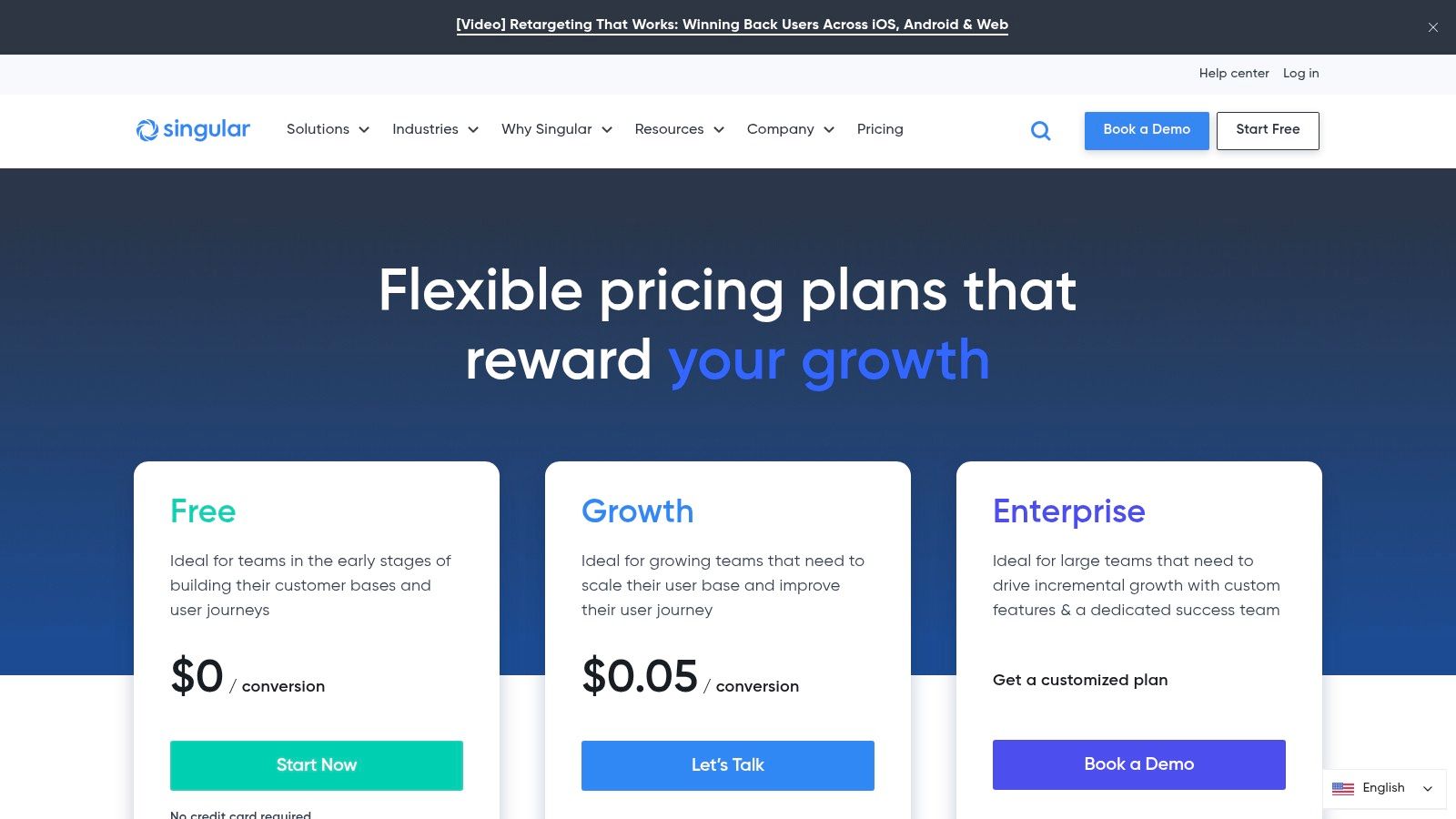
The platform’s standout feature is its ability to automatically collect, normalise, and enrich marketing campaign data from thousands of sources. This allows marketers to analyse ROI with unparalleled granularity, right down to the creative level. This detailed insight is crucial for understanding how to measure advertising effectiveness in the highly competitive mobile space. Furthermore, its advanced features like SKAN cohort prediction help marketers navigate the privacy-centric landscape of iOS advertising.
Core Features & Limitations
Singular’s strength lies in its deep mobile focus and comprehensive data aggregation capabilities. However, this specialisation can also be a limitation for businesses whose primary focus is web or OTT, as these channels require a more custom setup. The per-conversion pricing model, while transparent, can also become costly as campaign volume scales up significantly.
| Aspect | Details |
|---|---|
| Best For | Mobile-first businesses, app marketers, and performance marketing teams needing deep ROI analytics and fraud prevention for app campaigns. |
| Pricing | Free plan for up to 15,000 paid conversions. Beyond that, a custom cost-per-conversion model applies. Visit singular.net for details. |
| Key Advantage | Unifies mobile attribution with cost aggregation from thousands of sources, providing a single source of truth for marketing spend and ROI. |
| Limitation | Primarily focused on mobile; web and OTT attribution require more complex integration and are not the core strength of the platform. |
11. Northbeam
For high-growth e-commerce and direct-to-consumer (DTC) brands, Northbeam has carved out a niche as a premier marketing attribution tool. It is specifically engineered to provide the granular, real-time insights performance marketing teams need to scale efficiently. The platform moves beyond standard analytics by combining multi-touch attribution (MTA) with creative-level analysis, allowing brands to see precisely which ads and channels are driving valuable conversions.
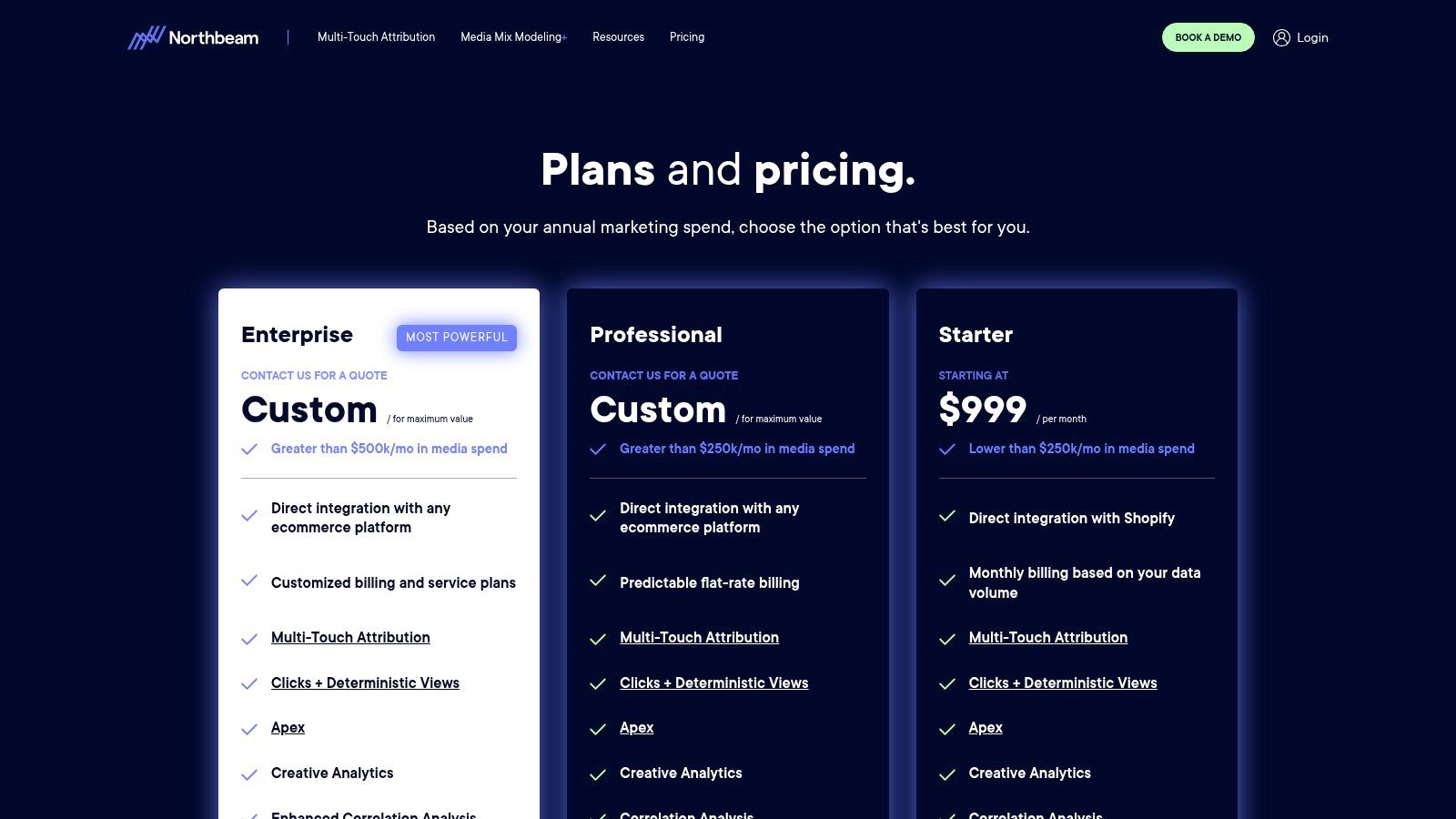
Northbeam’s core strength lies in its click-through and deterministic view-through tracking, offering a clearer picture than platform-reported data alone. Its real-time dashboards are designed for fast decision-making, helping marketers optimise spend on the fly. As businesses scale, higher-tier plans unlock advanced features like Marketing Mix Modelling (MMM+) and dedicated media strategist support, providing a comprehensive solution that grows with a brand’s advertising budget and analytical needs. This specialisation makes it a standout choice for DTC businesses focused on maximising ROI from paid social and search campaigns.
Core Features & Limitations
While Northbeam is incredibly powerful for its target audience, its focus on e-commerce can be a limitation for other business models. The entry-level plan is restricted to Shopify users, and pricing is directly tied to media spend, which can become a significant investment for larger advertisers. However, for brands where every ad pound counts, the depth of insight often justifies the cost.
| Aspect | Details |
|---|---|
| Best For | Scaling DTC and e-commerce brands heavily invested in paid advertising channels like Meta, TikTok, and Google. |
| Pricing | Tiered based on monthly ad spend, starting from around $400/month. View pricing details at northbeam.io. |
| Key Advantage | Deep, creative-level performance insights and a platform built specifically for the pace and needs of e-commerce marketers. |
| Limitation | Can be cost-prohibitive for larger spenders, and the starter plan’s functionality is limited to the Shopify ecosystem. |
12. Fospha (UK)
Fospha positions itself as a UK-based, privacy-first measurement platform specifically designed to tackle the challenges of modern marketing attribution. It’s built for direct-to-consumer (DTC) brands that need to understand performance beyond last-click, especially in a post-iOS14 world. The platform blends multi-touch attribution with Marketing Mix Modelling (MMM) style analysis to provide a more holistic view of performance.
What makes Fospha stand out is its focus on incrementality and customer acquisition cost (CAC) optimisation. It unifies data from key channels like Meta, TikTok, and Google, offering clear, cross-channel ROAS dashboards. For UK businesses concerned with data compliance, its privacy-safe methodology is a significant advantage. The onboarding process is notably swift, including historical data backfill to provide immediate insights and performance forecasts.
Core Features & Limitations
While powerful, Fospha’s value is unlocked by connecting multiple data sources, including ad platforms, GA4, and e-commerce backends like Shopify. Its advanced feature set and pricing structure are geared towards brands with a substantial marketing spend who are looking to scale efficiently and need more sophisticated marketing attribution tools to guide their decisions.
| Aspect | Details |
|---|---|
| Best For | Scaling DTC brands and e-commerce businesses in the UK seeking a privacy-compliant, incrementality-focused solution. |
| Pricing | Starts from £750/month, with transparent pricing tiers based on ad spend available on their website. |
| Key Advantage | Combines multi-touch attribution with MMM for a complete funnel view, helping to solve post-iOS14 tracking issues. |
| Limitation | Requires multiple data source integrations and is better suited for businesses with significant advertising budgets. |
Marketing Attribution Tools Feature Comparison
| Tool | Core Features & Attribution ✨ | User Experience ★★★★☆ | Value & Pricing 💰 | Target Audience 👥 | Unique Selling Points 🏆 |
|---|---|---|---|---|---|
| Google Analytics 4 (GA4) | Cross-channel data-driven attribution, lookback windows | Free, wide adoption, seamless Google Ads integration | 💰 Free | SMEs, marketers needing baseline attribution | Free platform with solid Google Ads integration |
| Adobe Marketo Measure | Multi-touch revenue attribution, CRM stage alignment | Enterprise-grade, complex setup | 💰 Enterprise pricing on request | B2B enterprises, CRM-focused sales teams | Prebuilt & custom models, AI-driven attribution |
| Adobe Analytics | Algorithmic attribution (Shapley), unlimited model testing | Analyst-friendly, detailed insights | 💰 Enterprise license required | Data analysts, enterprises | Advanced algorithmic models beyond paid media |
| Ruler Analytics (UK) | Multi-touch web/call/chat attribution, CRM integrations | UK/EU compliance, call tracking available | 💰 Transparent UK pricing, usage-based | UK SMEs, lead gen, call-heavy marketers | Strong call tracking with UK data privacy focus |
| Dreamdata | Account-based multi-touch, audience building | Free starter plan, fixed pricing | 💰 Free tier + fixed pricing | B2B, ABM marketers | Clear build-vs-buy guidance, strong account focus |
| AppsFlyer | Real-time mobile multi-touch, SKAdNetwork, fraud detection | Market leader, flexible pay-as-you-go | 💰 Free Zero plan + paid growth | Mobile app marketers | Extensive ad network integrations, fraud protection |
| Adjust | Click & impression attribution, GDPR/EU data residency | Free base tier, scalable tiers | 💰 Transparent per-volume | App marketers, privacy-conscious businesses | Strong privacy & security certifications |
| Branch | Deep linking, QR codes, partner-backed ad attribution | Transparent pricing, enterprise compliance | 💰 Mid-market starting price | Mobile app & startup to enterprise | Powerful linking + attribution ecosystem |
| Kochava | Mobile/web attribution, fraud prevention, identity linking | Generous free tier, detailed attribution control | 💰 Free analytics tier + paid plans | Early-stage apps, cross-channel marketers | Identity resolution & configurable rules |
| Singular | Mobile attribution, cost aggregation, fraud prevention | Free tier with paid conversion pricing | 💰 Transparent cost per conversion | Mobile marketers, data-driven advertisers | Comprehensive ROI & creative analytics |
| Northbeam | DTC multi-touch attribution, MMM+ modeling | Real-time dashboards, media strategist support | 💰 Tiered by media spend, Shopify starter | Direct-to-consumer brands | Specialized DTC insights & MMM+ integration |
| Fospha (UK) | Privacy-safe unified measurement, MMM & CAC optimization | Transparent pricing, strong support | 💰 Transparent examples, focus on larger spenders | UK/EU DTC brands with significant marketing | Incrementality focus post-iOS14 with fast onboarding |
Final Thoughts
Navigating the complex landscape of marketing attribution can feel daunting, but as we’ve explored, the right tools can transform opaque data into a crystal-clear roadmap for growth. We’ve journeyed through a comprehensive list of the industry’s leading marketing attribution tools, from the foundational capabilities of Google Analytics 4 to the highly specialised, enterprise-level power of platforms like Adobe Marketo Measure and the mobile-first precision of AppsFlyer and Adjust.
The core lesson is that there is no single “best” tool; there is only the best tool for your business. The ideal choice hinges on a careful evaluation of your unique circumstances, your budget, and the specific questions you need to answer. A UK-based e-commerce brand focused on Google Shopping, for instance, might find immense value in a solution like Ruler Analytics or Fospha, which are built with a deep understanding of the local market and customer journey. Conversely, a B2B SaaS company with a long, complex sales cycle will likely gravitate towards the revenue attribution models offered by Dreamdata or Adobe Marketo Measure.
Key Takeaways for Choosing Your Tool
To distil our deep dive into actionable insights, remember these crucial points:
- Start with Your ‘Why’: Before you even look at a feature list, define your primary goal. Are you trying to justify marketing spend, optimise your channel mix, understand the B2B buyer’s journey, or track mobile app installs? Your core objective will immediately narrow the field.
- Acknowledge Your Technical Reality: Be honest about your team’s technical expertise and resources. Some marketing attribution tools require significant development work for implementation and ongoing management, while others are designed for a more plug-and-play experience. Don’t choose a powerful tool that your team cannot realistically manage.
- Model Matters: Understand the difference between single-touch (first/last click) and multi-touch (linear, time-decay, U-shaped, data-driven) attribution models. As your business grows, moving beyond last-click attribution is not just an advantage; it’s a necessity for accurate performance measurement and strategic budget allocation.
- Don’t Overlook Integration: Your attribution tool must seamlessly connect with your existing marketing and sales stack. Check for native integrations with your CRM (like Salesforce or HubSpot), advertising platforms (Google Ads, Meta Ads), and analytics platforms. Poor integration creates data silos, defeating the purpose of a unified view.
Your Actionable Next Steps
Armed with this information, your path forward should be methodical. Create a shortlist of two to three platforms from our list that align with your business model and budget. Request demos for each and come prepared with specific questions about how their tool would solve your unique challenges. Ask them to walk you through a use case that mirrors your own customer journey.
Implementation is just the beginning. The real value of these marketing attribution tools is unlocked through consistent analysis and action. Use the insights to reallocate budgets, refine your messaging, and optimise underperforming channels. Attribution is not a one-off project; it’s an ongoing discipline that fuels a culture of data-driven decision-making and continuous improvement. By choosing wisely and committing to the process, you can finally connect your marketing efforts directly to revenue, proving ROI and steering your business towards sustainable, predictable growth.
Feeling overwhelmed by the data and struggling to connect your ad spend to actual results? At PPC Geeks, we live and breathe this stuff. We leverage advanced attribution insights to build and manage high-performance PPC campaigns that drive real growth for UK businesses. Get in touch with us today to see how our expert team can help you unlock the full potential of your digital advertising.
Author
Search Blog
Free PPC Audit
Subscribe to our Newsletter
The Voices of Our Success: Your Words, Our Pride
Don't just take our word for it. With over 100+ five-star reviews, we let our work-and our satisfied clients-speak for us.
"We have been working with PPC Geeks for around 6 months and have found Mark and the team to be very impressive. Having worked with a few companies in this and similar sectors, I rate PPC Geeks as the strongest I have come across. They have taken time to understand our business, our market and competitors and supported us to devise a strategy to generate business. I value the expertise Mark and his team provide and trust them to make the best recommendations for the long-term."
~ Just Go, Alasdair Anderson
